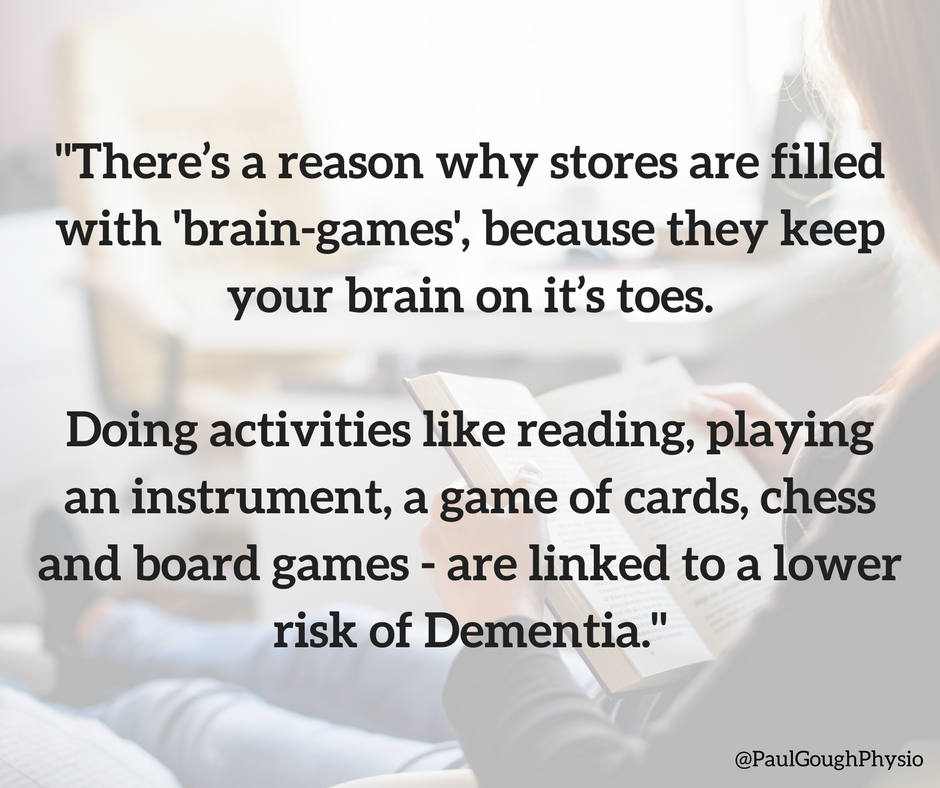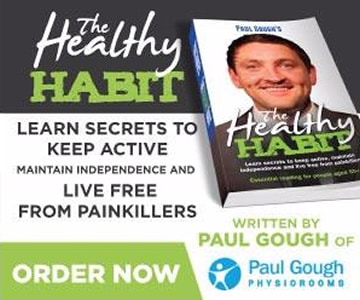
One of the things we worry about most as we get older is our memory, and the thought of it gradually getting worse.
How do I know this? Because, a lot of people we see at the physio rooms are aged 50+, and it’s one of the most common conversations we hear before people step in the treatment room, (my Mam included, she’s always putting things down to her ‘bad memory’).
If the facts you used to call up in a split second sometimes seem to have boarded a slow train to the part of the brain that needs them… Or, if you’re worried about forgetting things, names, words or where you left your keys – I want you to know there’s simple things you can do about it.
As we get older, we might find ourselves unable to remember someone’s name, where we left the house keys, or what we ate for tea last night, and that’s just the beginning.
Then before we know it, we’re forgetting to turn off the oven, or struggling to recall passwords and PINs that we’ve been using for years and used to use without having to think at all.
If that sounds familiar, you’re not alone.
Next to losing our ability to get out and about and keep active, memory loss and a declining ability to concentrate are two of our most common fears associated with getting older.
Why does this happen? Well, according to Neuroscientists between the ages of 30 and 90 some of our brain cells begin to decrease in size. But the majority of memory related problems associated with age are caused by poor concentration, motivation, or from anxiety and stress.
Add to that we don’t tend to work our brains as hard as we used to as we get older, it’s no wonder why some of us can become a bit forgetful.
Your memory is like any other muscle. You need to use it to function at an optimum level. and in the case of memory, there’s a lot of truth in the old adage: ‘use it or lose it’.
So, how can you get your memory back on track and stay sharp?
Luckily there are many practical steps you can take, to slow a foggy memory down and keep it on the ball – I’m going to share a few of those with you today.
1. Exercise to boost your memory
A lot of studies have found that exercise plays a big role in improving your memory, so when you get your body moving not only your body will benefit, but your brain will too!
Exercise triggers changes in the brain, which means our thinking ability stays sharp, and our memories clear.
If you don’t already exercise, start slow with gentle, short walks, and build up from there.
And if you do – keep going! And maybe turn your walk into a brisk walk, or light jog to challenge yourself a little bit more.
2. Drink enough to keep your memory sharp
We get told all the time about the importance of drinking enough water during the day, and there’s many good reasons for it! If you don’t drink enough, you can become dehydrated. And as well as causing pounding headaches, dehydration can affect your memory (something not a lot of us are aware of!).
What to drink? Obviously water is always a good choice – to make it easier, aim to have a full glass of water with every meal and in between meals too. Squash, tea, eating fruits and vegetables also count if you’re not a big fan of drinking water alone.
3. Give your brain a workout to boost your memory
This is where the ‘use it or lose it’ phrase comes in. There’s a reason why stores are filled with cognitive games, because they keep your brain on it’s toes.
Doing activities like reading, playing an instrument, a game of cards, chess and board games – are linked to a lower risk of Dementia.
But it’s important to not just stick to things you know, it’s called a brain workout for a reason – learn something new, and give your brain something challenging to get stuck into.
4. Eat good food
I don’t mean you have to go on a special diet, just make some healthy changes to your diet and you should feel the benefits in all sorts of ways – including a better memory and sharper brain.
When you do your next food shop, fill your basket with plenty of vegetables, both green and leafy, all different type of fruits, fresh poultry, fish, whole grains, olive oil and even wine (but not too much), and you’ll be supplying your body and brain with a wide variety of nutrients – key to good brain health!
Studies have even shown that making a conscious effort to include a wider variety of vitamins and nutrients in your diet can lower the risk of Alzheimer’s by as much as 53%.
I’ve been making some changes to my diet over the last few months, and my mind feels clearer than ever. No drastic diet needed.
5. Your memory needs sleep too
Again, another important aspect of health, but it’s important for a reason! Making sure you get enough shut-eye is important for both your physical and mental health. If you don’t get enough sleep each night, in the short term it can affect the decisions you make and how well you learn and remember information.
Have you ever felt like your mind feels tired and a bit ‘foggy’ after a late night?… You can thank a lack of sleep for that.
If you find it hard to get enough sleep on a night, and get to bed early, taking naps (even for as little as 20 minutes) can make a difference to how you feel and give you more mental clarity.
So, there you have it!
As you can see there’s several ways you can keep your memory and brain health in good check, and those are just 5 ways that you can easily put into play as soon as today.
The two big takeaways I hope you’ll come away with are:
1. A healthy lifestyle is the foundation for a fit and resilient brain and a good memory.
And…
2. You are not stuck with the memory you have today. Memory is a skill you can learn and improve.
Start taking these steps today and you can upgrade your memory now and keep it sharp in the years to come.
===
===
P.S. If you, or someone you know, is suffering from daily, annoying back pain, here’s free special report with 9 tips to help keep you active and mobile with less back pain, just go here to get your free copy: www.paulgoughphysio.com/back-pain
Or click here:


